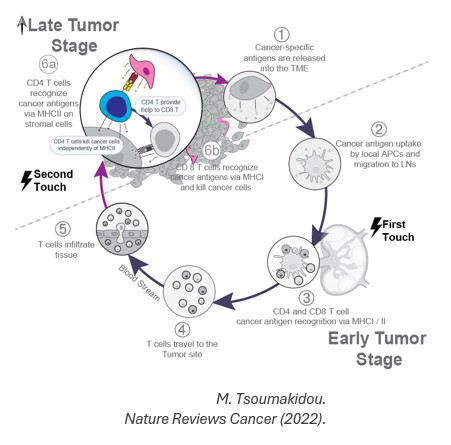Towards Efficient Cancer Immunotherapies: Deciphering The Landscape Of Antigen-Presenting Cells.
 We explore the dynamic interactions between cancer cells and the adaptive immune system, challenging established paradigms of immunosuppression in the tumor microenvironment. By leveraging disease modelling, gene perturbations and high-throughput high-resolution phenotyping approaches, we identify and characterize immunostimulatory cancer antigen presenting cells that actively enhance T cell-mediated immunity. Our research underscores the potential of stromal cells as antigen-presenting cells, a concept that we have integrated into the "peripheral adaptive immune mesenchyme" framework. We have also revised the cancer immunity cycle to incorporate “the second touch hypothesis”. We posit that re-activation of the T cell receptors (TCRs) of CD4+ T cells within tumors is key for tumor rejection and seek roadmaps to harness intratumoral antigen presentation for effective cancer immunotherapy.
We explore the dynamic interactions between cancer cells and the adaptive immune system, challenging established paradigms of immunosuppression in the tumor microenvironment. By leveraging disease modelling, gene perturbations and high-throughput high-resolution phenotyping approaches, we identify and characterize immunostimulatory cancer antigen presenting cells that actively enhance T cell-mediated immunity. Our research underscores the potential of stromal cells as antigen-presenting cells, a concept that we have integrated into the "peripheral adaptive immune mesenchyme" framework. We have also revised the cancer immunity cycle to incorporate “the second touch hypothesis”. We posit that re-activation of the T cell receptors (TCRs) of CD4+ T cells within tumors is key for tumor rejection and seek roadmaps to harness intratumoral antigen presentation for effective cancer immunotherapy.
Our work is guided by the following fundamental questions:
- Which cell types present cancer antigens?
- What are their origins?
- Which are bystanders, suppressors or drivers of cancer immunity?
- What is the role of intratumoral cancer antigen presentation?
- How does the tumor microenvironment shape the antigen presenting cell landscape?